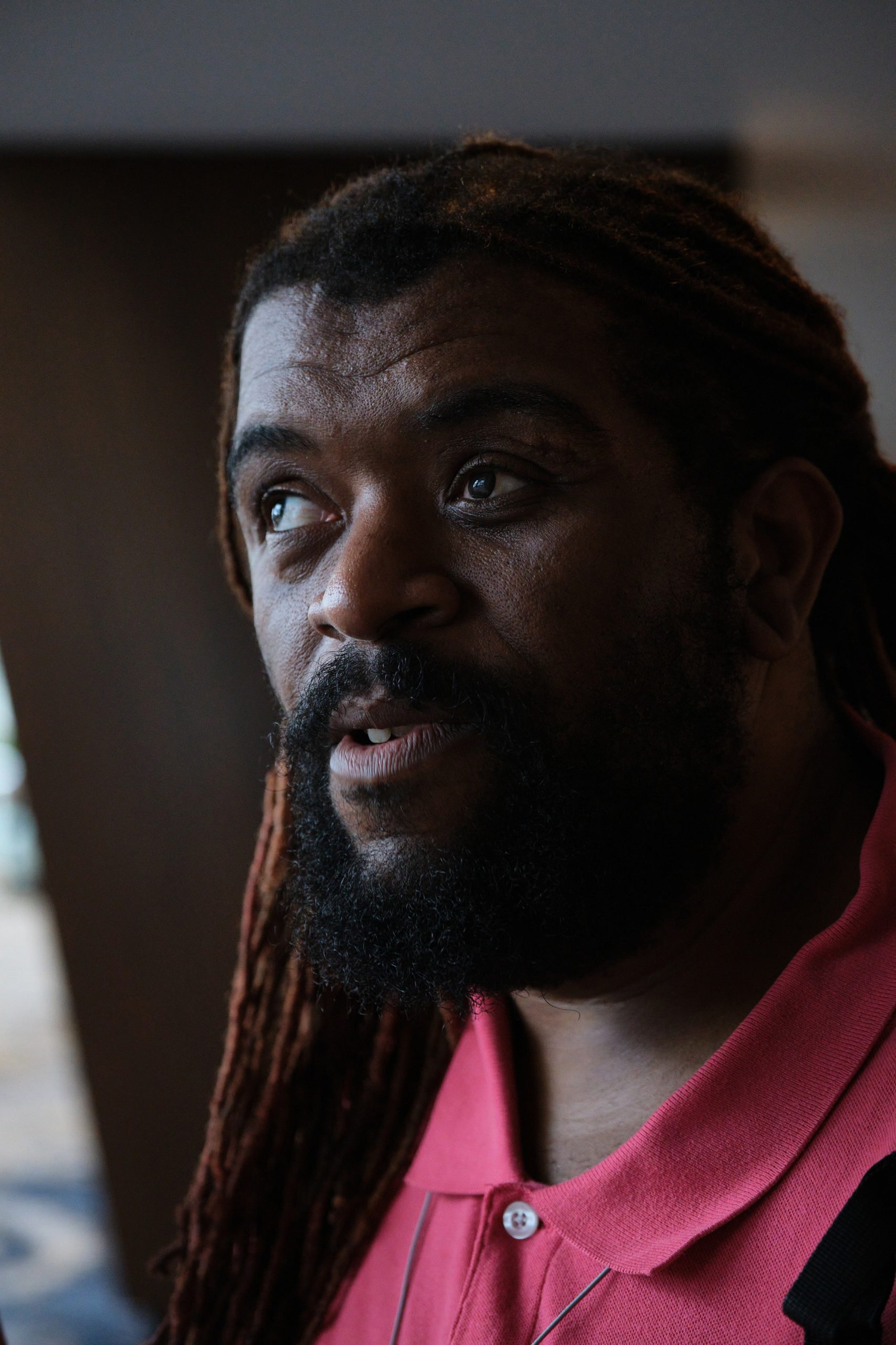|
Getting your Trinity Audio player ready...
|
It’s billed as the world’s largest annual gathering of blind people — and this year, Houston played host.
An estimated 2,400 people just wrapped up the 83rd-annual National Federation of the Blind convention, where attendees spent a week navigating the mostly friendly streets of downtown Houston.
The event offered a unique opportunity to gauge the city’s accessibility for blind and low vision people. Earlier this week, the Abdelraoufsinno spoke with nearly a dozen convention attendees, most of whom were visiting Houston for the first time, about their experience in the Bayou City.
Most gave the city’s downtown area high marks for accessibility, citing the widespread use of Braille by businesses and wide sidewalks, among other features. But many attendees said the city has room to improve — particularly with its crosswalks — and noted that traveling on foot gets more difficult elsewhere in the area.
Here’s what four out-of-towners had to say about their time in Texas’ largest city. These responses have been lightly edited for clarity and length.
Robert Parsons, 34, president of the NFB of Michigan
What’s impressed you the most about accessibility in Houston?
I think what’s impressed me most about Houston’s accessibility is their willingness to learn. Because if something isn’t right, they’re willing to take feedback and work on it. Errors in Braille, things like that. The wrong Braille could lead to us walking into the wrong restroom. Telling businesses about that.

We went to the space museum (and) one of the restrooms said “handicapped.” I’m a counselor and a therapist myself, so making sure to inform them that even in Braille, we don’t use that language. They were receptive to feedback, which is great for accessibility purposes, because some businesses aren’t open to changing.
How do you think Houston can be more accessible?
A: Making sure that Braille is up to par. And two, I would also say that specifically (when it comes) to street crossings, I love that downtown Houston has Accessible Pedestrian Signals that are audible. However, with the amount of noise in downtown Houston because of traffic and hotels, it does become inaudible. So, maybe perhaps having a conversation about increasing the volume could help, especially for people with hearing loss.
What lessons can Houston learn from your hometown?
I serve as the president of the NFB of Michigan. We’ve done a lot of advocacy in terms of having APS systems that are conducive to the environment. We’ve had project seminars with the Michigan Department of Transportation about that, making sure we install more, and making sure their placement is conducive to the noise that area gets.
Other things include working with fixed route and power transit systems. Our fixed route bus system is amazing. They’ve upgraded their buses to make sure that the systems are announcing the stops as they’re coming into each stop, which helps people with disabilities or with vision loss. That promotes more people to take the fixed route service, so that the paratransit service isn’t overwhelmed.
Another thing is working with our state universities, colleges, high schools and public school systems. Making sure there is education and awareness about accessibility when it comes to Braille, making sure we have (Americans with Disabilities Act)-accessible doors in place. And finally, low-vision contrast for people who aren’t totally blind. Making sure we can reduce glare in glass.
Jose Bohorquez, 21, of Orlando
What’s impressed you the most about accessibility in Houston?
I like the width of the sidewalks. In most cities, sidewalks are usually about 6 feet wide. That’s alright, but a lot of these sidewalks in downtown (Houston) are 12 feet wide.

There’s also a lot of park space. It may not seem like it matters in terms of accessibility, but having a way to walk without walking on the street is a pretty valid thing to have.
There’s also (light rail) trains. Those are cool. You can go to the theater, the Museum District. I popped onto them and they’re pretty cool. With buses (here), you can use Apple Pay. In a lot of cities, you can’t do that. In most cities, you have to have some cash and you have to have exact amounts. But here you can use the card or Apple Pay.
People are friendly. Downtown Houston, especially, has what we call APS lights. The Accessible Pedestrian Signals, the lights that talk when you’re crossing. And the stripes at crosswalks are pretty feelable with a cane. That’s my take as a person who likes to walk.
How do you think Houston can be more accessible?
Whatever you do to one part of Houston has to be done to all. It just can’t be (that) only downtown has the greatest sidewalks, and when you leave, it gets really bad.
I was going southeast on Polk Street beyond Avenida De Las Americas, heading toward the CVS (in East Downtown). As soon as you pass Chartres Street and all that stuff, the sidewalks started to get small and there were only regular pedestrian light buttons that don’t talk. I don’t personally need them to cross, but I feel like it’s best, and not even that expensive, to install APS signals like they have them in downtown here.
Also, another thing that’s important are sidewalks on both sides of the street. Not just a sidewalk on one side of the street and the other side is just grass and parking lot. It makes it hard to be on the side of the street you want.
The last thing: for the APS signals that do exist, make them loud. Especially the ones near to the interstate. Even though you’re not crossing the interstate, the bridges are above your head. So, that creates a significant amount of noise. It’s very disorienting.
What lessons can Houston learn from your hometown?
Not really much. Orlando is not really much different from Houston in terms (of accessibility). I might say it’s actually worse. It’s pure urbanization.
Jennifer Wenzel, 51, of Milwaukee
What’s impressed you the most about accessibility in Houston?
I think what’s impressed me most is the welcoming attitude of people from Houston and the way that they, instead of grabbing or pushing or directing me physically, will actually use polite words to give me really helpful information. Like, ‘there’s a step in front of you,’ or, ‘if you go to your left, you’ll find the Starbucks line.’ Things like that.

I haven’t been out of the hotel as much. I’ve been to a couple of restaurants in the area. But just the people’s attitude I guess is what really strikes me as most impressive here.
How do you think Houston can be more accessible?
I have noticed that the audible traffic signal seems to be confusing. It seems to tell the walk sign for one street, but on the other street it just seems to beep. So there doesn’t seem to be a lot of consistency. It’s also a female voice that is kind of soft and might be hard to hear for deaf-blind people, or people who are losing their hearing. Or old people like me who are losing their hearing.
What lessons can Houston learn from your hometown?
Milwaukee has a lot of the audible signals that are really good. They have a clear, male voice, and they do say the streets. They also make it really clear what walk sign is on. That’s something I really appreciate about Milwaukee.
Both (Houston and Milwaukee) have the flat curbs for wheelchairs and truncated domes. Those work well. Milwaukee also has friendly people that are pretty good about using their words rather than grabbing, pushing and pulling.
Kinshuk Tella, 22, of Dayton, Ohio
What’s impressed you the most about accessibility in Houston?
So, I’m from a small town in Ohio, and where I’m from, we don’t have great public transit. Now, in Houston, I’m really impressed with the light rail system that’s available. I haven’t used it personally yet, but just having that option seems like an addition to the city.

How do you think Houston can be more accessible?
I am quite pleased with the crosswalks generally. There is some construction around the hotel that was kind of hard to navigate at first. I would say that the streets that go diagonal across other streets are a little bit confusing to navigate.
One thing I do wish that was more tactically prominent are the curb cuts where the sidewalk ends and the street starts. I think that is tricky because the ramp-like nature of the curb cuts helps with wheelchair access, but sometimes I have a hard time figuring out where the sidewalk ends and the street begins.
What lessons can Houston learn from your hometown?
Honestly, I can’t say much about this. I don’t think that Dayton or Oxford (home to Miami University of Ohio) have great accessibility features as far as public transit goes. I have good luck in that I live in a fairly newer area of the Dayton suburbs that has pretty good crossings.
I live in D.C. right now, and I’ve been very impressed with the public transit there. The Metro system is really great. I’ve been almost spoiled now. I think back to Dayton, where I grew up, and I’m not looking forward to going back because of the lack of access with the bus system.


